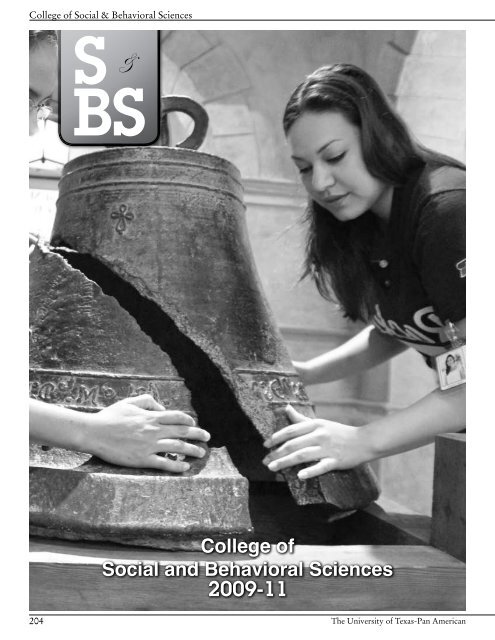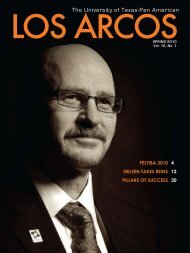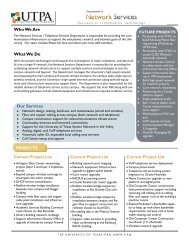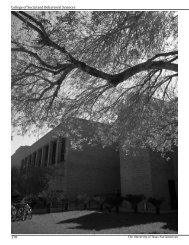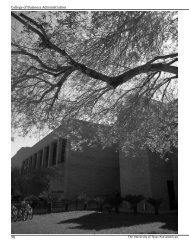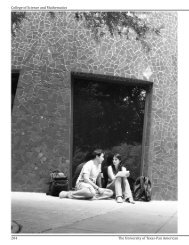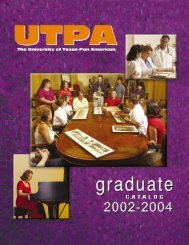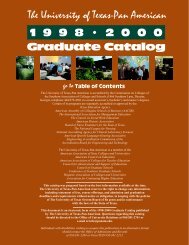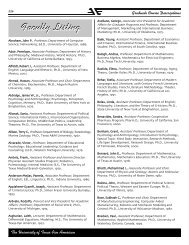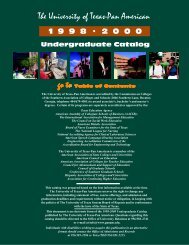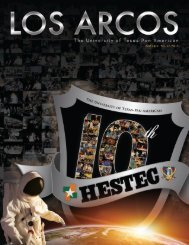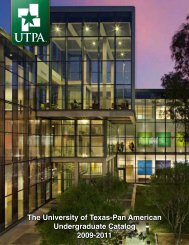College of Social and Behavioral Sciences - The University of Texas ...
College of Social and Behavioral Sciences - The University of Texas ...
College of Social and Behavioral Sciences - The University of Texas ...
Create successful ePaper yourself
Turn your PDF publications into a flip-book with our unique Google optimized e-Paper software.
<strong>College</strong> <strong>of</strong> <strong>Social</strong> & <strong>Behavioral</strong> <strong>Sciences</strong>S&BS<strong>College</strong> <strong>of</strong><strong>Social</strong> <strong>and</strong> <strong>Behavioral</strong> <strong>Sciences</strong>2009-11204<strong>The</strong> <strong>University</strong> <strong>of</strong> <strong>Texas</strong>-Pan American
<strong>College</strong> <strong>of</strong> <strong>Social</strong> & <strong>Behavioral</strong> <strong>Sciences</strong><strong>The</strong> three minors selected may come from any academicdepartment within the <strong>University</strong> that <strong>of</strong>fers a major orminor. Students must complete all the requirements for eachminor. Some minors may require more than 18 hours perminor.Free Electives206Including a minimum <strong>of</strong> 15 advanced hours.Other RequirementsA minimum <strong>of</strong> 51 hours <strong>of</strong> advanced coursework.TOTAL23 hours120 hoursGlobal Security StudiesDr. S<strong>and</strong>ra Hansmann, Program DirectorE-mail: sshansmann@utpa.eduNi c k We i m e r, Pr o g r a m Ma n a g e rLamar Building, Room 1211201 W. <strong>University</strong> DriveEdinburg, TX 78539-2999Telephone: 956/388-8088Fax: 956/388-8089E-mail: newimer@utpa.edus Minor in Global Security Studies (GSST)<strong>The</strong> Global Security Studies minor is appropriate forany major. Its purpose is to prepare students for careersin intelligence, national security, <strong>and</strong> other sectors <strong>of</strong> theglobal economy through advanced interdisciplinary studies.<strong>The</strong> minor degree focuses on advanced research, effectivecross-discipline team communication, <strong>and</strong> critical analysis.<strong>The</strong> GSST minor prepares students to work with peoplefrom different backgrounds, abilities, <strong>and</strong> knowledge bases.Students gain perspective <strong>and</strong> pr<strong>of</strong>iciency from multipledisciplines related to careers in the global economy.s Requirements<strong>The</strong> GSST minor consists <strong>of</strong> 18 semester hours <strong>of</strong>study, including a foundational nine-hour Core Sequence<strong>of</strong> advanced undergraduate interdisciplinary, team-based,communication-intensive research <strong>and</strong> instruction, <strong>and</strong>a nine-hour content concentration, such as language,comparative politics, international studies, science <strong>and</strong>engineering, education, health sciences, etc. <strong>The</strong> optionspermit broad higher order knowledge <strong>and</strong> skill integration asrequired by future employers.Completion <strong>of</strong> 30 hours <strong>and</strong> a 3.0 GPA are requiredfor electing the minor. A 3.0 cumulative GPA <strong>and</strong> a 3.0GPA within the minor are required in order to completethe minor. Two introductory language courses other thanEnglish or Spanish or two advanced (3000- level or higher)language courses in any language other than English are corequisitesto the minor.s AdvisingStudents electing the Global Security Studies minor mustreceive advising by the minor advisor. <strong>The</strong> minor advisormust approve all minor coursework. For more informationon this minor, please visit our website atwww.utpa.edu/igknu.Public AdministrationDr. William L. Turk, Interim Director<strong>Social</strong> <strong>and</strong> <strong>Behavioral</strong> <strong>Sciences</strong> Building, Room 2291201 W. <strong>University</strong> DriveEdinburg, TX 78539-2999Telephone: 956/381-2545Fax: 956/381-2139E-mail: turk@utpa.edus Minor in Public Administration<strong>The</strong> <strong>College</strong> <strong>of</strong> <strong>Social</strong> <strong>and</strong> <strong>Behavioral</strong> <strong>Sciences</strong> <strong>of</strong>fersboth a minor <strong>and</strong> a master’s degree in public administration.<strong>The</strong> field <strong>of</strong> Public Administration orients one towarda career in public service in government agencies at thefederal, state, regional <strong>and</strong> local levels, <strong>and</strong> in nonpr<strong>of</strong>itorganizations.<strong>The</strong> public administration minor requires the completion<strong>of</strong> 18 semester hours.Select six courses from the following list:PUBA 3323 Introduction to PublicAdministrationPUBA 3324 Bureaucracy <strong>and</strong> Organizational<strong>The</strong>oryPUBA 3325 Public Personnel AdministrationPUBA 4309 Public Fiscal AdministrationPOLS 3314 American State <strong>and</strong> LocalGovernmentPUBA 4378 Management <strong>of</strong> NonPr<strong>of</strong>itOrganizationsPUBA 4310 Comparative Public AdministrationPOLS 3316 American Public PolicyPOLS 4365 American Administration ProcessPUBA 4362 Independent StudyPUBA 4363 Special Topics<strong>The</strong> <strong>University</strong> <strong>of</strong> <strong>Texas</strong>-Pan American
2009-2011 Undergraduate Catalogs Criminal Justice sDr. S. George Vincentnathan,Department Chair<strong>Social</strong> <strong>and</strong> <strong>Behavioral</strong> <strong>Sciences</strong> Building, Room 3211201 W. <strong>University</strong> DriveEdinburg, TX 78539-2999Telephone: 956/381-3566Fax: 956/381-2490E-mail: gvincent@utpa.eduFu l l-Ti m e Fa c u l t yAppiahene-Gyamfi, Joseph, Associate Pr<strong>of</strong>essorBowe, George, LectureDantzker, Mark, Pr<strong>of</strong>essorDearth, Daniel K., Associate Pr<strong>of</strong>essorEthridge, Philip, Associate Pr<strong>of</strong>essorGonzales, Stanley, LectureResendiz, Rosalva, Associate Pr<strong>of</strong>essorVincentnathan, S. George, Pr<strong>of</strong>essorVincentnathan, Lynn, Assistant Pr<strong>of</strong>essorWhite, Thomas, Assistant Pr<strong>of</strong>essorLynch, Robert, Lecture___________________________________________s General Overview<strong>The</strong> mission <strong>of</strong> the Department <strong>of</strong> Criminal Justice isto impart knowledge <strong>and</strong> promote critical thinking aboutthe crime problem <strong>and</strong> its control through criminal justiceinstitutions <strong>and</strong> public cooperation. Students receivecomprehensive criminal justice education with courses takenin the areas <strong>of</strong> criminal law, criminology, policing, courts,corrections <strong>and</strong> crime prevention, in the context <strong>of</strong> a general<strong>and</strong> liberal arts education with background in the socialsciences. <strong>The</strong> main aim <strong>of</strong> the department is to help studentsdevelop the knowledge <strong>and</strong> analytical abilities to becomeagents <strong>of</strong> change in criminal justice organizations <strong>and</strong> servewell the communities in which they are located.<strong>The</strong> learning objectives <strong>of</strong> the Department <strong>of</strong> CriminalJustice are:1. Develop the knowledge <strong>of</strong> criminal justice theories<strong>and</strong> practices <strong>and</strong> pr<strong>of</strong>essional abilities to addresscriminal justice issues for crime control.2. Gain a liberal arts education to help underst<strong>and</strong>human behavior <strong>and</strong> cultural diversity, <strong>and</strong> followethically fair practices <strong>and</strong> integrative values to serve<strong>and</strong> live in a democratic society.3. Develop abilities <strong>and</strong> skills to analyze crime <strong>and</strong>criminal justice issues in a disciplined <strong>and</strong> criticalmanner for policy-making <strong>and</strong> problem solving.Prepare s Discover s Transform ss Degree RequirementsMajor in Criminal JusticeUpon completion <strong>of</strong> all requirements students will beawarded a Bachelor <strong>of</strong> Science in Criminal Justice (BSCJ)degree with a major in criminal justice.<strong>University</strong> Core Curriculum Requirements43 hoursComplete the core curriculum requirements as shown onpages 99-101 <strong>of</strong> this catalog.NOTE: <strong>The</strong> Department <strong>of</strong> Criminal Justice stronglyadvises students to take Philosophy 2390 - Pr<strong>of</strong>essionalEthics.Criminal Justice Requirement(Core 27 + Electives 21)Criminal Justice Core48 hours27 hoursCRIJ 1301 Introduction to the CriminalJustice SystemCRIJ 1306 Court Systems <strong>and</strong> PracticesCRIJ 2313 Correctional Systems <strong>and</strong> PracticesCRIJ 2328 Police Systems <strong>and</strong> PracticesCRIJ 3303 CriminologyCRIJ 3304 Criminal Justice Research MethodsCRIJ 3305 Statistical Applications in CriminalJustice*CRIJ 3310 <strong>The</strong> Constitution <strong>and</strong> Criminal LaworPOLS 4321 American Constitutional Law:LibertiesCRIJ 4399 Criminal Justice System-Capstone* Prerequisite: Take one course — MATH 1340, MATH2330 or equivalent, or higher level mathematics (MATH) orstatistics (STAT) course, except MATH 1348, <strong>and</strong> advancedsophomore st<strong>and</strong>ing. CRIJ 3304 Research Methods is highlyrecommended.Criminal Justice Electives21 hoursCRIJ 1307 Crime in AmericaCRIJ 2335 Legal Aspects <strong>of</strong> CorrectionsCRIJ 3320 Juvenile Delinquency <strong>and</strong> JusticeCRIJ 3325 Violent CrimeCRIJ 3341 Probation <strong>and</strong> ParoleCRIJ 3344 Gender, Crime <strong>and</strong> Criminal JusticeCRIJ 3355 Criminal Evidence <strong>and</strong> Pro<strong>of</strong>CRIJ 4311 Criminal Justice AdministrationCRIJ 4312 Civil Liability in Criminal JusticeCRIJ 4313 Current Issues in Law EnforcementCRIJ 4314 Private Security <strong>and</strong> LossPreventionCRIJ 4316 Environmental Crime <strong>and</strong> Justice207
<strong>College</strong> <strong>of</strong> <strong>Social</strong> & <strong>Behavioral</strong> <strong>Sciences</strong>CRIJ 4321 White-Collar <strong>and</strong> Organized CrimeCRIJ 4322 TerrorismCRIJ 4335 Restorative <strong>and</strong> Community JusticeCRIJ 4343 Current Issues in CorrectionsCRIJ 4350 Peace, Nonviolence <strong>and</strong> JusticeCRIJ 4355 Current Issues in the CourtsCRIJ 4356 Law <strong>and</strong> SocietyCRIJ 4357 Crime Prevention TechniquesCRIJ 4361 Comparative Criminal JusticeSystemsCRIJ 4362 Special Topics in Criminal Justice(can be taken only once)CRIJ 4363 Independent Studies in CriminalJusticeCRIJ 4364 Field Internship ExperienceAdditional RequirementCriminal Justice Requirement in Sociology:SOCI 4333 <strong>Social</strong> <strong>The</strong>oryorSOCI 4352 <strong>Social</strong> Inequality3 hoursEach student must complete a minor selected from adiscipline other than criminal justice. <strong>The</strong> specific minorshould be selected in consultation with a faculty advisor.Departments vary in the number <strong>of</strong> required total semesterhours <strong>and</strong> number <strong>of</strong> required advanced hours in theirrespective minors. Some departments <strong>of</strong>fer minors requiringonly six advanced hours but allow additional advanced hoursto be selected from electives.Summary <strong>of</strong> Degree Requirements<strong>University</strong> Core Curriculum43 hoursCRIJ 3310 <strong>The</strong> Constitution <strong>and</strong> Criminal LawCRIJ 3320 Juvenile Delinquency <strong>and</strong> JusticeCRIJ 3325 Violent CrimeCRIJ 3341 Probation <strong>and</strong> ParoleCRIJ 3344 Gender, Crime <strong>and</strong> Criminal JusticeCRIJ 3355 Criminal Evidence <strong>and</strong> Pro<strong>of</strong>CRIJ 4311 Criminal Justice AdministrationCRIJ 4312 Civil Liability in Criminal JusticeCRIJ 4313 Current Issues in Law EnforcementCRIJ 4314 Private Security <strong>and</strong> LossPreventionCRIJ 4316 Environmental Crime <strong>and</strong> JusticeCRIJ 4321 White-Collar <strong>and</strong> Organized CrimeCRIJ 4322 TerrorismCRIJ 4335 Restorative <strong>and</strong> Community JusticeCRIJ 4343 Current Issues in CorrectionsCRIJ 4350 Peace, Nonviolence <strong>and</strong> JusticeCRIJ 4355 Current Issues in the CourtsCRIJ 4356 Law <strong>and</strong> SocietyCRIJ 4357 Crime Prevention TechniquesCRIJ 4361 Comparative Criminal JusticeSystemsCRIJ 4362 Special Topics in Criminal Justice*CRIJ 4363 Independent Studiesin Criminal Justice*CRIJ 4364 Field Internship Experience*Can be taken only once for credit.Course DescriptionsA listing <strong>of</strong> courses <strong>of</strong>fered by the Department <strong>of</strong>Criminal Justice can be found on page 252.Criminal JusticeSociology (4333 or 4352)MinorFree Electives48 hours3 hours18 hours8 hourss Military Science sTotal(Advanced Coursework Should Total120 hours51 hours)Minor in Criminal Justice<strong>The</strong> criminal justice minor requires the completion <strong>of</strong>18 semester hours in criminal justice. Nine semester hoursmust be advanced. Criminal justice majors cannot minor incriminal justice.Required Criminal Justice Courses9 hoursCRIJ 1301 Introduction to Criminal JusticeCRIJ 2328 Police Systems <strong>and</strong> PracticesCRIJ 2313 Correctional Systems <strong>and</strong> PracticesCriminal Justice ElectivesSelect three courses from the following:CRIJ 3303 Criminology9 hoursLt. Col. Maricela Alvarado,ROTC Department ChairLamar Building B, Room 1041201 W. <strong>University</strong> DriveEdinburg, TX 78539-2999Telephone: 956/381-3600Fax: 956/381-3603E-mail: rotc@utpa.eduFu l l-Ti m e Fa c u l t yAlvarado, Maricela, Pr<strong>of</strong>essorRivers, Christopher, Col., Assistant Pr<strong>of</strong>essorMaloy, Lee R., Master Sgt., Senior Military InstructorMiles, Michael G., Master Sgt. (Retired),Enlisted Instructor___________________________________________208<strong>The</strong> <strong>University</strong> <strong>of</strong> <strong>Texas</strong>-Pan American
2009-2011 Undergraduate Catalogs General Overview<strong>The</strong> departmental objective is to develop selected men<strong>and</strong> women with potential to serve as commissioned <strong>of</strong>ficersin the active Army, National Guard or Army Reserve. <strong>The</strong>leadership <strong>and</strong> management experience gained through theROTC <strong>and</strong> service as a commissioned <strong>of</strong>ficer will benefitthe student in civilian as well as in military service <strong>and</strong>national defense pursuits. Students in the program have theopportunity to:1. Enhance leadership <strong>and</strong> managerial potential.2. Attain a basic underst<strong>and</strong>ing <strong>of</strong> military fundamentals<strong>and</strong> national security.3. Attain a clear underst<strong>and</strong>ing <strong>of</strong> the concept <strong>of</strong> militaryart <strong>and</strong> science.4. Develop a strong sense <strong>of</strong> personal honor, integrity <strong>and</strong>individual responsibility.ROTC Faculty Advisory Committee<strong>The</strong> ROTC Faculty Advisory Committee, composed <strong>of</strong>nine advisors from different departments, serves as liaisonwith the Department <strong>of</strong> Military Science <strong>and</strong> helps provideguidance on career opportunities with the Army, ArmyReserve or National Guard for students <strong>of</strong> other departmentsat <strong>The</strong> <strong>University</strong> <strong>of</strong> <strong>Texas</strong>-Pan American.s Army Scholarship ProgramStudents who meet prerequisites may compete fornationally or state-awarded U.S. Army scholarships that payfor tuition, books, fees <strong>and</strong> other purely educational costs<strong>and</strong> provide a tax-free monthly subsistence allowance for 10months <strong>of</strong> each year the scholarship is in effect. Free room<strong>and</strong> board is available on campus for a limited number <strong>of</strong>students, with priority going to ROTC scholarship winners.Several application deadlines exist. Contact the Department <strong>of</strong>Military Science for details.Veterans AssistanceVeterans who enroll in upper-level military sciencereceive a tax-free monthly subsistence allowance for 10months each <strong>of</strong> the two years, in addition to benefitsprovided by the Veterans Administration, Army Reserve orNational Guard.Simultaneous Membership Program (SMP)Eligible students are allowed to participate with ArmyReserve units or the National Guard combined with <strong>College</strong>ROTC. In addition to Reserve or National Guard pay,the student receives ROTC pay. In the SMP program, thestudent’s pay will be elevated to the rank <strong>of</strong> E-5 (sergeant)<strong>and</strong> the student will fill the position <strong>of</strong> a junior leader inthat unit. Upon completion <strong>of</strong> a bachelor’s degree <strong>and</strong> theROTC program, the student may be commissioned in theactive Army, Army Reserve or National Guard in the rank <strong>of</strong>second lieutenant.Departmental Activities<strong>The</strong> Department <strong>of</strong> Military Science sponsors severalextracurricular activities such as the annual Military Ball,Dining-Out, JROTC Day, Field Training Exercises <strong>and</strong>Guadalupe River canoe trip. Additional opportunities toparticipate in team events are available in Color Guard,Bronc Club <strong>and</strong> Ranger Challenge.Army TrainingSelected cadets enrolled in the course may be eligible tocompete for attendance to either the Airborne, Air Assault,Northern Warfare, Mountain Warfare or Cadet TroopLeadership Training. Selection is based motivation, physicalcondition <strong>and</strong> performance in military science.Minor in Military Science<strong>The</strong> Department <strong>of</strong> Military Science <strong>of</strong>fers a minor inmilitary science <strong>and</strong> a commission as an <strong>of</strong>ficer in the activeArmy, Army Reserve or National Guard through the ROTCprogram on the Edinburg campus.• No Commitment or Obligation for Lower-Level CoursesStudents need not seek a career in the U.S. Armyto enroll in lower-level courses such as marksmanship<strong>and</strong> first aid, survival <strong>and</strong> l<strong>and</strong> navigation training,<strong>and</strong> basic leadership, which provide the opportunityto increase individual skills <strong>and</strong> knowledge in leadership<strong>and</strong> management techniques in <strong>and</strong> outside theclassroom. Lower-level courses also fulfill the physicaleducation requirement for the <strong>University</strong> core curriculumrequirement.Requirements for Advanced Military Science• St<strong>and</strong>ing <strong>and</strong> Commissioning1. Complete four semesters <strong>of</strong> lower-level ROTCcourses or have advanced credit as a veteran, orfrom USAR/ARNG Basic Training, ROTC BasicCamp, or have JROTC credit <strong>and</strong> approval.2. Maintain full-time student status.3. Pass a military physical examination.4. Pass the ROTC Physical Aptitude Examination.5. Maintain an overall GPA <strong>of</strong> 2.0.6. Sign an Advanced ROTC <strong>and</strong> CommissioningAgreement.7. Successfully complete four semesters <strong>of</strong> advancedROTC courses.8. Successfully complete ROTC Leadership Camp.9. Successfully complete an undergraduatedegree program.10.Complete at least one departmentally approvedPr<strong>of</strong>essional Military Education course from each <strong>of</strong>the areas listed: written communication skills, humanbehavior, computer literacy, mathematics <strong>and</strong> militaryhistory.Prepare s Discover s Transform s209
<strong>College</strong> <strong>of</strong> <strong>Social</strong> & <strong>Behavioral</strong> <strong>Sciences</strong>Minor Requirements18 hours: ROTC 3202 plus 16 hours <strong>of</strong> advancedmilitary science courses (ROTC 3401, ROTC 3402, ROTC 4401,ROTC 4403).Course DescriptionsA listing <strong>of</strong> courses <strong>of</strong>fered by the Department <strong>of</strong>Military Science can be found on page 342.210s Political Science sDr. James Wenzel,Department Chair<strong>Social</strong> <strong>and</strong> <strong>Behavioral</strong> <strong>Sciences</strong> Building, Room 2081201 W. <strong>University</strong> DriveEdinburg, TX 78539-2999Telephone: 956/381-3341Fax: 956/381-2805E-mail: wenzel@utpa.eduFu l l-Ti m e Fa c u l t yAlianak, Sonia, Associate Pr<strong>of</strong>essorBaik, Ellen, Assistant Pr<strong>of</strong>essorBokina, John, Pr<strong>of</strong>essorChen, Xi, Assistant Pr<strong>of</strong>essorFreeman, Samuel, Associate Pr<strong>of</strong>essorCalderon Galdeano, Emily, LecturerHays, Robert, LecturerJackson, Ed, LecturerLavariega-Monforti, Jessica L., Assistant Pr<strong>of</strong>essorMcGlynn, Adam, Assistant Pr<strong>of</strong>essorMorgan, Glynn, Associate Pr<strong>of</strong>essorMounce, Gary, Associate Pr<strong>of</strong>essorNelson, James, LecturerPolinard, J.L., Pr<strong>of</strong>essorS<strong>and</strong>oval, Cecilia, LectureTurk, William, Associate Pr<strong>of</strong>essorWenzel, James P., Associate Pr<strong>of</strong>essorWrinkle, Robert, Pr<strong>of</strong>essor___________________________________________s General OverviewPolitical science majors <strong>and</strong> minors take courses in sixfields:• American Government <strong>and</strong> Politics,including local, state <strong>and</strong> national• Comparative Government <strong>and</strong> Politics• International Relations• Methods <strong>of</strong> Political Science Research• Political <strong>The</strong>ory• Public AdministrationPolitical science faculty <strong>and</strong> students are activelyinvolved in such campus activities as pre-law advising,student government <strong>and</strong> other student political activities.Students majoring in political science may pursue activecareers in public administration, law, national, state <strong>and</strong> localgovernment, diplomatic services, journalism, <strong>and</strong> teaching.Pre-Law<strong>The</strong> pre-law program includes the UTPA Law SchoolPreparation Institute (LSPI). <strong>The</strong> LSPI meets during thesecond summer session <strong>and</strong> focuses on developing theanalytical skills (including reading, writing <strong>and</strong> speakingskills) necessary to legal education. In addition to UTPAfaculty, faculty <strong>and</strong> staff from various law schools conductthe sessions. LSPI is limited to 20 full-time undergraduateUTPA students <strong>and</strong> participation is by invitation only. Formore information, contact Dr. Jerry Polinard at 956/381-3342 or at (polinard@utpa.edu).Minor in Legal StudiesComplete 18 hours from the following courses:BLAW 3337 Business Law ICRIJ 4356 Law <strong>and</strong> SocietyENG 3320 Special Topics (Legal Writing)HIST 3355 American Legal HistoryPOLS 4320 American Constitutional Law:FederalismPOLS 4321 American Constitutional Law:LibertiesPOLS 4367 American Judicial ProcessPSY 4342 Psychology <strong>and</strong> LawPHIL 4309 Law <strong>and</strong> Philosophys Degree RequirementsMajor in Political Science120 hours<strong>University</strong> Core Curriculum Requirements 43 hoursComplete the university core curriculum requirementsas shown on pages 99-101 <strong>of</strong> this catalog, including POLS2313 <strong>and</strong> 2314 or POLS 2387 <strong>and</strong> 2388.MATH 1340 is required by Political Science to fulfill theMath core requirement.Departmental RequirementsThree hours <strong>of</strong> Introductory Statistics (MATH/STAT2330, PSY/ANTH 2401, or SOCI 2301.9 hoursSix hours from two <strong>of</strong> the following three areas:• Introduction to Political Science (POLS 1333)• Introduction to Political Economy (POLS 2334)• Economics (ECON 2301 or ECON 2302)<strong>The</strong> <strong>University</strong> <strong>of</strong> <strong>Texas</strong>-Pan American
2009-2011 Undergraduate CatalogDesignated Advanced Coursework27 hours6 hours in American Government <strong>and</strong> Politics3 hours in Comparative Government3 hours in International Relations3 hours in Methods <strong>of</strong> Political ScienceResearch (POLS 3331)3 hours in Political <strong>The</strong>ory3 hours in Public Administration6 hours <strong>of</strong> advanced Political Science electivesHours for Minor <strong>and</strong> Electives18 hours in approved minor12 hours <strong>of</strong> 3000-4000 level electives11 hours <strong>of</strong> 1000-4000 level electives41 hoursMinor in Political ScienceEighteen hours in political science, <strong>of</strong> which nine hoursmust be advanced.Required CoursesPOLS 2313 U.S. <strong>and</strong> <strong>Texas</strong>Government <strong>and</strong> PoliticsPOLS 2314 U.S. <strong>and</strong> <strong>Texas</strong>Government <strong>and</strong> PoliticsDesignated ElectivesPOLS 1333 Introduction to Political ScienceorPOLS 2334 Political EconomyNine advanced hours in political science.Course DescriptionsA listing <strong>of</strong> courses <strong>of</strong>fered by the Department <strong>of</strong>Political Science can be found on page 329.s Psychology<strong>and</strong> Anthropology sDr. Valerie James-Aldridge,Department Chair<strong>Social</strong> <strong>and</strong> <strong>Behavioral</strong> <strong>Sciences</strong> Building, Room 3561201 W. <strong>University</strong> DriveEdinburg, TX 78539-2999Telephone: 956/381-3329Fax: 956/381-3333E-mail: psyanthdept@utpa.eduWeb site: www.utpa.edu/dept/psych-anths Psychology sFu l l-Time Fa c u l t yAlaniz, Martha, Senior LecturerAldridge, James W. Jr., Pr<strong>of</strong>essorAlfaro, Edna, Assistant Pr<strong>of</strong>essorArmstrong, Blake, Senior LecturerBenham, Grant, Associate Pr<strong>of</strong>essorCain, Roy E., Associate Pr<strong>of</strong>essorCroyle, Kristin, Associate Pr<strong>of</strong>essorEisenman, Russell, Associate Pr<strong>of</strong>essorErnst, Fred, Pr<strong>of</strong>essorGasquoine, Philip, Associate Pr<strong>of</strong>essorGonzalez, Genaro, Pr<strong>of</strong>essorHirai, Michyo, Assitant Pr<strong>of</strong>essorJames-Aldridge, Valerie G., Associate Pr<strong>of</strong>essorJou, Jerwen, Pr<strong>of</strong>essorLeka, Gary, LecturerKendrick, Sherrill, Assistant Pr<strong>of</strong>essorMontgomery, Gary T., Pr<strong>of</strong>essorPenzerra, Rose, Senior LecturerRogers, Darrin, Assistant Pr<strong>of</strong>essorSkidmore, Susan, Assistant Pr<strong>of</strong>essorWeimer, Amy, Assistant Pr<strong>of</strong>essorWinkel, Mark H., Associate Pr<strong>of</strong>essorWisener, Robert H. III, Assistant Pr<strong>of</strong>essor___________________________________________s General OverviewA major is <strong>of</strong>fered in psychology with either a Bachelor<strong>of</strong> Arts or a Bachelor <strong>of</strong> Science degree. A dem<strong>and</strong> existsfor baccalaureate psychology graduates in public <strong>and</strong> privateagencies dealing with human relations.However, the more challenging <strong>and</strong> specialized fieldsin psychology usually require further study beyond thebachelor’s degree. High academic st<strong>and</strong>ards are requiredPrepare s Discover s Transform s211
<strong>College</strong> <strong>of</strong> <strong>Social</strong> & <strong>Behavioral</strong> <strong>Sciences</strong><strong>of</strong> those students planning to do graduate work, <strong>and</strong> theprogram is designed to ensure that students planning furtherstudy acquire a background that will maximize their chances<strong>of</strong> success in graduate school. Training in research methods,statistics <strong>and</strong> theory are required <strong>of</strong> all majors. Accordingto their own interests, majors take further courses in theareas <strong>of</strong> clinical, experimental, social <strong>and</strong> developmentalpsychology. Students pursuing the Bachelor <strong>of</strong> Sciencedegree also take further courses in the natural sciences.Whenever possible, students are involved in the manyongoing research programs <strong>of</strong> the department, giving thempractical experience in the discipline.In addition, the department <strong>of</strong>fers a minor inpsychology.Mission<strong>The</strong> Department <strong>of</strong> Psychology <strong>and</strong> Anthropology isan academic administrative unit within the <strong>College</strong> <strong>of</strong> <strong>Social</strong><strong>and</strong> <strong>Behavioral</strong> <strong>Sciences</strong> at <strong>The</strong> <strong>University</strong> <strong>of</strong> <strong>Texas</strong>-PanAmerican. <strong>The</strong> department has been established to facilitateaccomplishing the <strong>University</strong> mission to meet the highereducation needs <strong>of</strong> the citizenry <strong>of</strong> South <strong>Texas</strong> <strong>and</strong> thestate <strong>of</strong> <strong>Texas</strong>. <strong>The</strong> department is committed to excellencein instruction, student performance, research, scholarlyaccomplishment <strong>and</strong> pr<strong>of</strong>essional service in the disciplinesconstituting psychology <strong>and</strong> anthropology.<strong>The</strong> Department <strong>of</strong> Psychology <strong>and</strong> Anthropologystrives to fulfill its responsibilities by providing qualityundergraduate academic programs in anthropology <strong>and</strong>psychology. At the graduate level, the department providesopportunities for students with baccalaureate degreesto pursue advanced study in clinical <strong>and</strong> experimentalpsychology. (More information on graduate programsis available in the Graduate Catalog.) <strong>The</strong> department iscommitted to providing an environment <strong>of</strong> academic freedom<strong>and</strong> responsibility so that faculty may develop <strong>and</strong> implementsuccessful teaching activities that ensure high st<strong>and</strong>ards <strong>of</strong>instruction <strong>and</strong> student performance.<strong>The</strong> Department <strong>of</strong> Psychology <strong>and</strong> Anthropologyrecognizes that its faculty has a commitment to those research<strong>and</strong> creative activities indicative <strong>of</strong> scholarly excellence. <strong>The</strong>department attempts to nurture <strong>and</strong> support such activitiesso that faculty may maintain currency in their knowledge <strong>of</strong>subject matter, vibrancy in their teaching, dedication to theirrespective disciplines <strong>and</strong> interest in extending the boundaries<strong>of</strong> human knowledge <strong>and</strong> underst<strong>and</strong>ing.<strong>The</strong> Department <strong>of</strong> Psychology <strong>and</strong> Anthropologyis also committed to providing effective instructionalopportunities for all students at the <strong>University</strong>, regardless <strong>of</strong>their major area <strong>of</strong> concentration. <strong>The</strong> department attemptsto meet this goal by providing students with instructionin several areas <strong>of</strong> study that ground the liberal artstradition. To this end, the department provides instructionalopportunities for all students to develop further thefollowing characteristics indicative <strong>of</strong> a university-educatedperson:1. An inquiring attitude that acknowledges the manysidednature <strong>of</strong> most important questions, recognizesthe need to examine inherited judgments, <strong>and</strong> revealsa desire for continued learning <strong>and</strong> creativeexpression.2. <strong>The</strong> ability to use words accurately <strong>and</strong> effectively,<strong>and</strong> to communicate clearly in oral <strong>and</strong> writtenformats.3. <strong>The</strong> ability to analyze complex problems <strong>and</strong> tosynthesize facts <strong>and</strong> ideas.4. An appreciation for the responsibilities <strong>of</strong> theindividual to family <strong>and</strong> society; skill in serving asa constructive member in groups <strong>and</strong> organizations;<strong>and</strong> sensitivity to the need for informed, independent,moral <strong>and</strong> ethical decisions.5. Knowledge <strong>of</strong> political <strong>and</strong> social systems in theUnited States <strong>and</strong> other nations, <strong>and</strong> theirinterrelationships.6. An underst<strong>and</strong>ing <strong>of</strong> self, along with an empathy forthe strengths, weaknesses, rights <strong>and</strong> needs <strong>of</strong> others,as well as the ability to relate to others with humanunderst<strong>and</strong>ing.<strong>The</strong> Department <strong>of</strong> Psychology <strong>and</strong> Anthropology isalso committed to sponsoring service activities that meet theintellectual <strong>and</strong> cultural interests <strong>of</strong> the <strong>University</strong> <strong>and</strong> thecommunity that the <strong>University</strong> serves.s Degree RequirementsMajor in Psychology (BA Degree)<strong>University</strong> Core Curriculum Requirements 43 hoursComplete the university core curriculum requirementsas shown on pages 99-101 <strong>of</strong> this catalog.A social science outside <strong>of</strong> psychology is required to fillthe core social science requirement.Core Courses16 hoursPSY 1310 Introduction to PsychologyPSY 2401 Basic Statistics for PsychologistsPSY 3325 Research Methods in PsychologyPSY 3343 Tests <strong>and</strong> Measurements inPsychologyPSY 3353 Physiological PsychologyElectives15 hoursSelect 15 hours <strong>of</strong> psychology courses, nine <strong>of</strong> which mustbe advanced.Other requirements for BA or BS degree in psychology.Please be aware <strong>of</strong> the “Requirements for a Bachelor’sDegree” enumerated on pages 99-101. <strong>The</strong>se includecompletion <strong>of</strong> a total <strong>of</strong> 120 hours <strong>of</strong> coursework,completion <strong>of</strong> a minor <strong>and</strong> completion <strong>of</strong> a minimum <strong>of</strong> 51hours <strong>of</strong> upper-level (3000/4000) coursework.212<strong>The</strong> <strong>University</strong> <strong>of</strong> <strong>Texas</strong>-Pan American
2009-2011 Undergraduate CatalogMajor in Psychology (BS Degree)<strong>University</strong> Core Curriculum Requirements 43 hoursComplete the <strong>University</strong> core curriculum requirementsas shown on pages 99-101 <strong>of</strong> this catalog.A social science outside <strong>of</strong> psychology is required to fillthe core social science requirement.Core Courses16 hoursPSY 1310 Introduction to PsychologyPSY 2401 Basic Statistics for PsychologistsPSY 3325 Research Methods in PsychologyPSY 3343 Tests <strong>and</strong> Measurements inPsychologyPSY 3353 Physiological PsychologyDesignated ElectivesSelect one course from each <strong>of</strong> the followingfour areas:(12 hours):a). Cognitive FoundationsPSY 3373 Sensation <strong>and</strong> PerceptionPSY 4319 Cognitive ProcessesPSY 4320 MemoryPSY 3345 Psychology <strong>of</strong> Learningb). <strong>The</strong>oretical FoundationsPSY 4318 <strong>The</strong>ories <strong>of</strong> LearningPSY 4363 Systems <strong>and</strong> <strong>The</strong>ories inPsychologyPSY 4333 <strong>The</strong>ories <strong>of</strong> Personalityc). Developmental/<strong>Social</strong>/Cultural FoundationsPSY 3324 <strong>Social</strong> PsychologyPSY 3332 Infancy Through AdolescencePSY 3333 Psychology <strong>of</strong> Adulthood:Maturity <strong>and</strong> Old AgePSY 3337 Developmental Psychology:LifespanPSY 3338 Gender DevelopmentPSY 4326PSY 4328d). ApplicationsPSY 3340PSY 3405PSY 4313PSY 4342PSY 4343ElectivesNine hours <strong>of</strong> psychology.Prepare s Discover s Transform sCross-Cultural PsychologyPsychological Issues in theMexican-American CommunityStress ManagementBehavior ModificationAbnormal PsychologyPsychology <strong>and</strong> LawHuman FactorsOther RequirementsAny eight hours <strong>of</strong> science in addition to the <strong>University</strong>core curriculum science requirement from the followingcan be taken in different disciplines: astronomy, biology,anatomy <strong>and</strong> physiology, chemistry, geology, physicalscience, <strong>and</strong> physics.Please be aware <strong>of</strong> the “Requirements for abachelor’s Degree” enumerated on pages 99-101. <strong>The</strong>seinclude completion <strong>of</strong> a total <strong>of</strong> 120 hours <strong>of</strong> coursework,completion <strong>of</strong> a minor, <strong>and</strong> completion <strong>of</strong> a minimum <strong>of</strong> 51hours <strong>of</strong> upper-level (3000/4000) coursework.Minor in PsychologyEighteen hours in psychology, <strong>of</strong> which six must beadvanced.Required CoursePSY 1310 Introduction to PsychologyCourse DescriptionsA listing <strong>of</strong> Psychology courses <strong>of</strong>fered can be found onpage 335.s Anthropology sDr. Thomas Pozorski,Anthropology Coordinator<strong>Social</strong> <strong>and</strong> <strong>Behavioral</strong> <strong>Sciences</strong> Building, Room 3221201 W. <strong>University</strong> DriveEdinburg, TX 78539-2999Telephone: 956/381-2865Fax: 956/381-3333E-mail: psyanthdept@utpa.eduWeb site: www.utpa.edu/dept/psych-anthFu l l-Ti m e Fa c u l t yGlazer, Mark, Pr<strong>of</strong>essorDorsey, Margaret, Assistant Pr<strong>of</strong>essorGraham, Margaret, Assistant Pr<strong>of</strong>essorLovett, Bobbie, LecturerHinojosa, Serv<strong>and</strong>o, Associate Pr<strong>of</strong>essorPozorski, Shelia, Pr<strong>of</strong>essorPozorski, Thomas, Pr<strong>of</strong>essorSkowronek, Russell, Pr<strong>of</strong>essorVincentnathan, Lynn, Assistant Pr<strong>of</strong>essor___________________________________________s General Overview<strong>The</strong> primary focus <strong>of</strong> both the major <strong>and</strong> minor ison anthropology as a broad-based discipline, with specialemphasis on cultural anthropology, physical anthropology,archaeology <strong>and</strong> folklore. Special topic courses are alsoavailable in advanced folklore, anthropological theory <strong>and</strong>methods, <strong>and</strong> New World archaeology.A major or minor in anthropology is particularlyappropriate for pr<strong>of</strong>essionals who plan to practice in South<strong>Texas</strong> or a comparable area made special by the meeting <strong>of</strong>different cultures. Anthropology also provides an excellent213
<strong>College</strong> <strong>of</strong> <strong>Social</strong> & <strong>Behavioral</strong> <strong>Sciences</strong>preparation for careers in international business, government,politics, criminal justice, social work <strong>and</strong> medicine or otherhealth-related pr<strong>of</strong>essions. <strong>The</strong> more specialized fields inanthropology usually require further study beyond thebachelor’s degree.Mission<strong>The</strong> Anthropology Program is an academic unitwithin the <strong>College</strong> <strong>of</strong> <strong>Social</strong> <strong>and</strong> <strong>Behavioral</strong> <strong>Sciences</strong> at<strong>The</strong> <strong>University</strong> <strong>of</strong> <strong>Texas</strong>-Pan American. <strong>The</strong> program hasbeen established to facilitate accomplishing the <strong>University</strong>’smission to meet the higher education needs <strong>of</strong> the citizenry <strong>of</strong>South <strong>Texas</strong> <strong>and</strong> the state <strong>of</strong> <strong>Texas</strong>. <strong>The</strong> program is committedto excellence in instruction, student performance, research,scholarly accomplishment <strong>and</strong> pr<strong>of</strong>essional service in thediscipline <strong>of</strong> anthropology.<strong>The</strong> Anthropology Program strives to fulfill itsresponsibilities by providing quality undergraduateacademic programs in anthropology. Emphasis is placed onexposing students to a holistic approach to anthropologythat incorporates the three major subfields – culturalanthropology, physical anthropology <strong>and</strong> archaeology. Atthe graduate level, the program provides opportunities forstudents with baccalaureate degrees to fulfill an anthropologyconcentration for an interdisciplinary master’s degree <strong>and</strong> t<strong>of</strong>ulfill required graduate hours outside one’s field <strong>of</strong> study toearn a master’s degree in various disciplines at the <strong>University</strong>.<strong>The</strong> Anthropology Program is committed to providingan environment <strong>of</strong> academic freedom <strong>and</strong> academicresponsibility so that faculty may develop <strong>and</strong> implementsuccessful teaching activities that ensure high st<strong>and</strong>ards <strong>of</strong>instruction <strong>and</strong> student performance.<strong>The</strong> program recognizes that its faculty has acommitment to those research <strong>and</strong> creative activitiesindicative <strong>of</strong> scholarly excellence. <strong>The</strong> program attemptsto nurture <strong>and</strong> support such activities so that faculty maymaintain currency in their knowledge <strong>of</strong> subject matter,vibrancy in their teaching, dedication to their respectivedisciplines, <strong>and</strong> interest in extending the boundaries <strong>of</strong>human knowledge <strong>and</strong> underst<strong>and</strong>ing.<strong>The</strong> Anthropology Program is also committed toproviding effective instructional opportunities for allstudents at the <strong>University</strong>, regardless <strong>of</strong> their major area<strong>of</strong> concentration. <strong>The</strong> program attempts to meet this goalby providing students with instruction in several areas <strong>of</strong>study that ground the liberal arts tradition. To this end, theprogram provides instructional opportunities for all studentsto develop further the following characteristics indicative <strong>of</strong>a university-educated person:1. Learning about anthropology fosters an inquiringattitude that acknowledges the many-sided nature <strong>of</strong>most important questions, recognizes the need toexamine inherited judgments <strong>and</strong> reveals a desire forcontinued learning <strong>and</strong> creative expression.2. A holistic approach to anthropology hones a person’sability to use words accurately <strong>and</strong> effectively <strong>and</strong> tocommunicate clearly in oral <strong>and</strong> written formats.3. Anthropological thinking nurtures the ability toanalyze complex problems <strong>and</strong> to synthesize facts<strong>and</strong> ideas.4. Exposure to the field <strong>of</strong> anthropology encouragesan appreciation for the responsibilities <strong>of</strong> theindividual to family <strong>and</strong> society; skill in serving asa constructive member in groups <strong>and</strong> organizations;<strong>and</strong> sensitivity to the need for informed, independent,moral <strong>and</strong> ethical decisions.5. Learning about anthropology increases knowledgeabout political <strong>and</strong> social systems in the United States<strong>and</strong> other nations, <strong>and</strong> their interrelationships. Suchmulticultural perspectives can foster greater underst<strong>and</strong>ing, tolerance <strong>and</strong> respect for different lifestyles<strong>and</strong> viewpoints.6. Anthropology encourages an underst<strong>and</strong>ing <strong>of</strong> self,along with an empathy for the strengths, weaknesses,rights <strong>and</strong> needs <strong>of</strong> others, as well as the ability torelate to others with human underst<strong>and</strong>ing.<strong>The</strong> Anthropology Program is also committed tosponsoring service activities that meet the intellectual <strong>and</strong>cultural interests <strong>of</strong> the <strong>University</strong> <strong>and</strong> the community thatthe <strong>University</strong> serves.s Degree Requirements<strong>The</strong> department <strong>of</strong>fers a major in anthropology leadingto the Bachelor <strong>of</strong> Arts degree.Major in Anthropology<strong>University</strong> Core Curriculum Requirements43 hoursComplete the <strong>University</strong> core curriculum requirementsas shown on pages 99-101 <strong>of</strong> this catalog.A social science outside <strong>of</strong> anthropology is required to fillthe core social science requirement.<strong>College</strong> <strong>of</strong> <strong>Social</strong> <strong>and</strong> <strong>Behavioral</strong> <strong>Sciences</strong> 3 hoursThree hours in a separate social science discipline outsidethe major <strong>and</strong> the social science taken to fill the UTPAsocial science core requirement.Core Courses15 hoursANTH 1323 Introduction to CulturalAnthropologyANTH 1324 Human EvolutionANTH 1342 Introduction to ArchaeologyANTH 1353 Introduction to FolkloreANTH 4345 Anthropological <strong>The</strong>ory <strong>and</strong>MethodologyDesignated Electives21 hoursSelect 21 hours from anthropology. A substitution forone three-hour course may be chosen from the following list<strong>of</strong> related courses.Related courses214<strong>The</strong> <strong>University</strong> <strong>of</strong> <strong>Texas</strong>-Pan American
2009-2011 Undergraduate CatalogENG 3319 Descriptive LinguisticsENG 3321 Language <strong>and</strong> CultureOther RequirementsA minimum <strong>of</strong> 24 hours in anthropology must be at theadvanced level.Please be aware <strong>of</strong> the “Requirements for a bachelor’sDegree” enumerated on pages 99-101. <strong>The</strong>se includecompletion <strong>of</strong> a total <strong>of</strong> 120 hours <strong>of</strong> coursework,completion <strong>of</strong> a minor <strong>and</strong> completion <strong>of</strong> a minimum <strong>of</strong> 51hours <strong>of</strong> upper-level (3000/4000) coursework.Minor in AnthropologyEighteen hours in anthropology, <strong>of</strong> which six hours mustbe advanced.Required CoursesANTH 1323 Introduction to CulturalAnthropologyANTH 1324 Human EvolutionANTH 4345 Anthropological <strong>The</strong>ory <strong>and</strong>MethodologyMinor in Folklore<strong>The</strong> minor in folklore requires 18 credit hours* asdelineated below:Required CoursesANTH 1353 Introduction to Folklore3 hours15 hours from: 15 hoursANTH 1354 <strong>The</strong> Anthropology <strong>of</strong>Expressive CultureorMUS 1308 Mexican Folk MusicANTH 3344 Archive StudiesANTH 4353 Folklore <strong>of</strong> the Rio Gr<strong>and</strong>e ValleyANTH 4355 Psychology <strong>and</strong> MythologyorPSY 4355 Psychology <strong>and</strong> MythologyANTH 4350 Mexican-American Folk Medicine*Only six hours can be taken in courses at the 1300 level.Course DescriptionsA listing <strong>of</strong> courses <strong>of</strong>fered by Anthropology can befound on page 220.s Sociology sDr. Chad Richardson, Department Chair<strong>Social</strong> <strong>and</strong> <strong>Behavioral</strong> <strong>Sciences</strong> Building, Room 3441201 W. <strong>University</strong> DriveEdinburg, TX 78539-2999Telephone: 956/381-3321Fax: 956/381-2343E-mail: cr33d5@utpa.eduJuan BustamanteAdvisor Undergraduate Program<strong>Social</strong> <strong>and</strong> <strong>Behavioral</strong> <strong>Sciences</strong> Building, Room 336Telephone: 956/292-7483Fax: 956/381-2343E-mail: jbustamant@utpa.eduFu l l-t i m e Fa c u l t yBustamante, Juan, LecturerChamberlain, Jenny, Senior LecturerDe La Cruz, Marcie, Senior LecturerDominguez, Armondo, Senior LecturerGarcia, Jesse, LecturerGuerra, Ramon S., Associate Pr<strong>of</strong>essorLiebowitz, Stephen W., Associate Pr<strong>of</strong>essorRaajpoot, Uzzer A., Associate Pr<strong>of</strong>essorRichardson, Chad D., Pr<strong>of</strong>essorRyabov, Igor, Assistant Pr<strong>of</strong>essorSu, Dejun, Assistant Pr<strong>of</strong>essorWang, Guang-zhen, Pr<strong>of</strong>essor___________________________________________s General Overview<strong>The</strong> Department <strong>of</strong> Sociology <strong>of</strong>fers a major in sociologyleading to a Bachelor <strong>of</strong> Arts degree, as well as a minor insociology.Students majoring <strong>and</strong> minoring in sociology receiveexcellent preparation for careers in public <strong>and</strong> privateagencies dealing in human relations. <strong>The</strong> more challenging<strong>and</strong> specialized fields in sociology usually require furtherstudy beyond the bachelor’s degree. Sociology also providesan excellent background for those considering careers in suchfields as education, health, law, law enforcement, business<strong>and</strong> journalism.Prepare s Discover s Transform s215
<strong>College</strong> <strong>of</strong> <strong>Social</strong> & <strong>Behavioral</strong> <strong>Sciences</strong>s Degree RequirementsMajor in Sociology<strong>University</strong> Core Curriculum Requirements 43 hoursComplete the university core curriculum requirementsas shown on pages 99-101 <strong>of</strong> this catalog.Students may not count Sociology toward the social sciencerequirement in the <strong>University</strong> core curriculum.<strong>College</strong> <strong>of</strong> <strong>Social</strong> <strong>and</strong> <strong>Behavioral</strong> <strong>Sciences</strong> 3 hoursThree additional hours <strong>of</strong> social science courses in aseparate social science discipline outside sociology <strong>and</strong> thesocial science taken to fill the core curriculum requirementsuch as anthropology, criminal justice, economics, politicalscience or psychology.Core Courses18 hoursSOCI 1313 Principles <strong>of</strong> SociologySOCI 2301 Statistics for the <strong>Behavioral</strong><strong>Sciences</strong>SOCI 3301 Quantitative <strong>Social</strong> ResearchSOCI 4333 <strong>Social</strong> <strong>The</strong>orySelect two from the following three courses:SOCI 3302 Qualitative <strong>Social</strong> ResearchSOCI 4334 Contemporary <strong>Social</strong> <strong>The</strong>orySOCI 4352 <strong>Social</strong> InequalityDesignated Electives15 hoursSelect 15 hours <strong>of</strong> sociology, <strong>of</strong> which at least nine hoursmust be upper level (3000-4999).Other Requirements for BA in SociologyPlease be aware <strong>of</strong> the “Requirements for a Bachelor’sDegree” enumerated on pages 205. <strong>The</strong>se include completion<strong>of</strong> a total <strong>of</strong> 120 hours <strong>of</strong> coursework, completion <strong>of</strong> a minor,<strong>and</strong> completion <strong>of</strong> a minimum <strong>of</strong> 51 hours <strong>of</strong> upper-level(3000/4000) coursework.Minor in SociologyEighteen hours in sociology, <strong>of</strong> which nine hours mustbe upper level. Must include the following:SOCI 1313 Principles <strong>of</strong> SociologySOCI 4333 <strong>Social</strong> <strong>The</strong>oryorSOCI 4352 <strong>Social</strong> InequalityCourse DescriptionsA listing <strong>of</strong> courses <strong>of</strong>fered by the Department <strong>of</strong>Sociology can be found on page 343.216<strong>The</strong> <strong>University</strong> <strong>of</strong> <strong>Texas</strong>-Pan American


